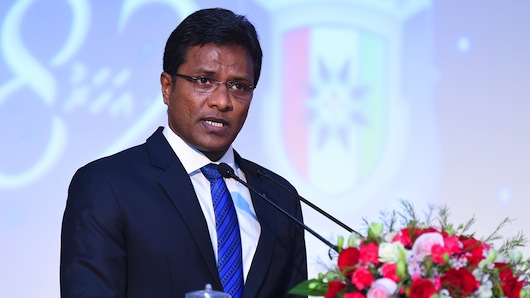Home minister Umar Naseer has vowed to keep ex-president Mohamed Nasheed in prison despite growing calls for his release by the international community.
“We will not free Nasheed. This government will not free him. I repeat it,” Naseer said in an interview on pro-government private broadcaster Dhi-TV on Thursday.
Nasheed is serving a 13-year jail term on terrorism charges relating to the arrest of a judge during his tenure. Foreign governments, international bodies including the UN and Amnesty International have criticized the trial for lack of due process.
The EU parliament in April passed a resolution calling for Nasheed’s immediate release and have urged member states to warn tourists on Maldives’ human rights record on their travel websites.
However, Naseer said the government “will not back down an inch” even if the main opposition Maldivian Democratic Party (MDP) is backed by 50 foreign governments. He went on to describe the MDP as a “lie factory.”
“There is no way will we hand the country to MDP. We will not back down an inch even if they come with 50 countries behind them,” he said.
“The government is built upon a very strong foundation. There is no way we will budge.”
Naseer said the MDP had planned to torch several buildings during a mass antigovernment protest on May Day. Nearly 200 people, including opposition leaders, were arrested when violent clashes erupted between the police and protesters.
Approximately 20,000 people had taken to the streets on May 1 over Nasheed and ex-defence minister Mohamed Nazim’s imprisonment.
Although the opposition has criticized the police for excessive force and brutality during the protest, Naseer congratulated the police force, saying they are the “most professional” force in the region.
He said the police had ten years of experience in controlling protests and condemned protesters for beating two police officers.
“MDP can only deceive others [the international community], not Maldivians,” he said.
The home minister once again denied allegations he had made of president Abdulla Yameen’s involvement in the brutal murder of MP Dr Afrasheem Ali in 2012.
Naseer had contested against Yameen during the Progressive Party of the Maldives’ (PPM) presidential primaries of 2013. When he lost, he held a public rally accusing Yameen of corruption, vote-rigging, illicit connections with criminal gangs, and said he saw a suspect in Afrasheem’s murder meeting with Yameen.
Naseer was expelled from the PPM when he refused to apologize for his remarks. He joined the Jumhooree Party (JP), and was given a cabinet portfolio after Yameen won the second round of polls with JP’s backing. The party left the ruling coalition in January.
“I said I saw a suspect in Afrasheem’s murder, after he was released, at the PPM office seeking a meeting with president Yameen. I did not say there is any connection between president Yameen and Afrasheem’s murder,” he said.
Naseer on Thursday said he had made the comments because of the “rivalry in the campaign,” and said the investigation does not suggest the president was involved in the murder at all.
In recent months, several defectors from the ruling coalition, including MP Ahmed Mahloof, have claimed president Yameen will know the truth behind Afrasheem’s murder.
In December 2012, then-police chief Abdulla Riyaz had said that Dr Afrasheem’s murder was politically motivated with a local gang offered MVR4 million (US$260,000) to carry it out.
The late moderate religious scholar and Progressive Party of Maldives MP was brutally stabbed to death on October 1, 2013 in a murder that shocked the nation.
Riyaz, now a JP MP, was summoned to the police last week when he said he would reveal details of Afrasheem’s murder “when the time comes” in an interview with a local TV station.
Hussain Humam, the chief suspect in the murder and the only person convicted of the crime so far, has alleged president Yameen and tourism minister Ahmed Adeeb’s involvement in the killing.
However, Adeeb accused the opposition of orchestrating Humam’s remarks in a “character assassination” attempt. Humam had said at the first hearing of his appeal at the High Court last month that president Yameen and Adeeb “will know best” the details of the murder.
Former president Maumoon Abdul Gayoom meanwhile told reporters that president Yameen should sue opposition politicians alleging his involvement in the murder for defamation and strongly condemned the insinuations.
